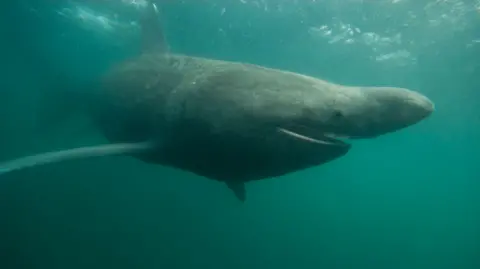The recent study conducted by scientists from the Centre for Environment, Fisheries, and Aquaculture Science (Cefas) reveals an intriguing dynamic in the marine ecosystems off the coast of the United Kingdom. As climate change continues to increase ocean temperatures, scientists anticipate significant shifts in the distribution and populations of various marine species within UK waters. Notably, endangered sharks, rays, and native oysters could see an upsurge in their numbers and habitats as they migrate towards newly favorable environments.
This transformation is largely attributed to the rising ocean temperatures that are profoundly affecting sea life. For instance, species such as the basking shark—a magnificent creature known for its impressive size and filter-feeding habits—are expected to find new niches within the UK waters, particularly in regions of the North Sea projected to become biodiversity hotspots over the next five decades. A surge in marine species populations could also mean better fishing opportunities and support for coastal communities reliant on marine resources for their livelihoods.
However, the report also points to a darker side of these ecological changes. While more mobile species might adapt to the new conditions more easily, static organisms may not adapt as well to their shifting environments. For instance, researchers identified concerns for the ocean quahog, a clam that boasts the title of the longest-living animal on the planet, with lifespans exceeding 500 years. The potential decline in such species can have cascading effects across marine ecosystems, disrupting food chains and overall marine health.
In an alarming prediction, certain creatures, including the sea pen—an essential part of reef-building communities—could lose nearly 40% of their suitable habitats by the turn of the century due to the changing ocean conditions. It’s vital to recognize that despite the potential for some species to thrive, many will need continued protection from external threats such as pollution and overfishing to succeed in these new habitats.
The study’s significance lies not only in its predictions about species distribution but also in its call for action. Marine scientist Bryony Townhill emphasizes the importance of carefully managing Marine Protected Areas (MPAs) as environmental shifts unfold. The findings reinforce the necessity for the UK government and relevant stakeholders to ensure that existing MPAs evolve alongside these species, to secure ongoing protection and adaptation strategies.
This study arrives against a backdrop of significant temperature spikes in UK waters, which recently recorded temperatures up to 4 degrees Celsius higher than the norms; a phenomenon underscored during the intense heatwave of May. These shifts illustrate the urgent need for sustained efforts in climate change mitigation and marine conservation. The UK seas rank among global hotspots for warming, reflecting the broader impacts of climate change that have seen the world’s oceans absorb a staggering 90% of the additional heat resulting from greenhouse gas emissions.
As communities and environmental groups monitor these shifts, the researchers noted that local observations align with these trends. Fishermen have reported unusual catches—including Mediterranean octopus—while beachgoers have manifested encounters with swarms of jellyfish, evidencing the ongoing transformation in marine ecosystems.
In closing, while certain marine species may thrive in response to climate conditions, the intricate balance of marine life hinges on robust environmental management and protective measures. The future of the UK seas will ultimately seek to balance ecological diversity with human economic interests, ensuring that both marine creatures and coastal communities adapt and flourish in a changing world. The findings of this research are hoped to inform future policies and approaches that prioritize marine life sustainability while addressing the real and pressing challenges posed by climate change.
Published in the journal Marine Biology, this research provides crucial insights and lays the groundwork for future studies that will address ongoing changes in the marine ecosystems surrounding the UK. It serves as a pivotal reminder of the interconnectedness of climate change impacts and the vital importance of preserving marine biodiversity amidst these transformations.



